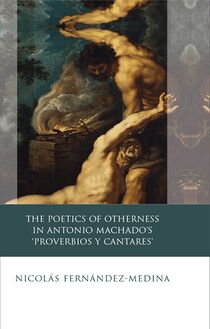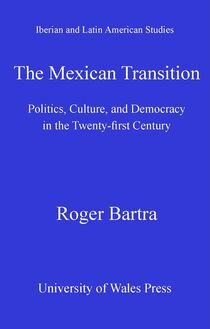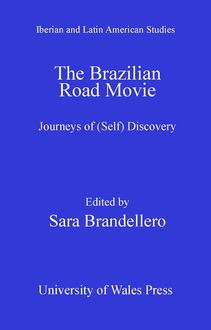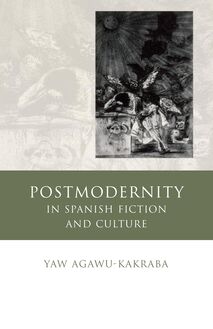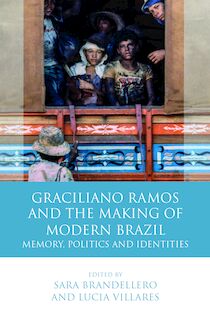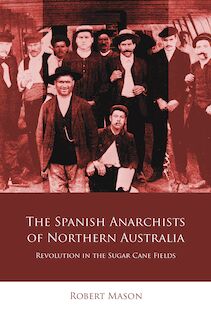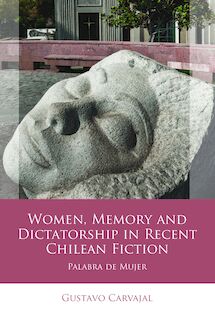Capitalism and its Discontents , livre ebook
157
pages
English
Ebooks
2017
Vous pourrez modifier la taille du texte de cet ouvrage
Obtenez un accès à la bibliothèque pour le consulter en ligne En savoir plus
Découvre YouScribe et accède à tout notre catalogue !
Découvre YouScribe et accède à tout notre catalogue !
157
pages
English
Ebooks
2017
Vous pourrez modifier la taille du texte de cet ouvrage
Obtenez un accès à la bibliothèque pour le consulter en ligne En savoir plus
Publié par
Date de parution
05 janvier 2017
Nombre de lectures
5
EAN13
9781783169566
Langue
English
Capitalism and its Discontents presents a series of interpretative essays on a number of key modern and contemporary Latin American novels and films. The overarching theme in the essays is the relation between such textual materials and their regional contexts.
Publié par
Date de parution
05 janvier 2017
EAN13
9781783169566
Langue
English
IBERIAN AND LATIN AMERICAN STUDIES
Capitalism and its Discontents
Series Editors
Professor David George (Swansea University)
Professor Paul Garner (University of Leeds)
Editorial Board
David Frier (University of Leeds)
Lisa Shaw (University of Liverpool)
Gareth Walters (Swansea University)
Rob Stone (University of Birmingham)
David Gies (University of Virginia)
Catherine Davies (University of London)
Richard Cleminson (University of Leeds)
Duncan Wheeler (University of Leeds)
Jo Labanyi (New York University)
Roger Bartra (Universidad Nacional Autónoma de México)
Other titles in the series
Catalan Cartoons: A Cultural and Political History
Rhiannon McGlade
Revolutionaries, Rebels and Robbers: The Golden Age of Banditry in Mexico, Latin America and the Chicano American southwest, 1850–1950
Pascale Baker
Teresa Margolles and the Aesthetics of Death
Julia Banwell
Galicia, A Sentimental Nation
Helena Miguelez-Carballeira
The Brazilian Road Movie
Sara Brandellero
The Spanish Civil War
Anindya Raychaudhuri
The Mexican Transition: Politics, Culture and Democracy in the Twenty-first Century
Roger Bartra
Adolfo Bioy Casares: Borges, Fiction and Art
Karl Posso
The Spanish Golden Age Sonnet
John Rutherford
IBERIAN AND LATIN AMERICAN STUDIES
Capitalism and its Discontents
Power and Accumulation in Latin American Culture
JOHN KRANIAUSKAS
© John Kraniauskas, 2017
All rights reserved. No part of this book may be reproduced in any material form (including photocopying or storing it in any medium by electronic means and whether or not transiently or incidentally to some other use of this publication) without the written permission of the copyright owner. Applications for the copyright owner’s written permission to reproduce any part of this publication should be addressed to the University of Wales Press, 10 Columbus Walk, Brigantine Place, Cardiff CF10 4UP.
www.uwp.co.uk
British Library CIP Data
A catalogue record for this book is available from the British Library
ISBN 978-1-78316-954-2
eISBN 978-1-78316-956-6
The right of John Kraniauskas to be identified as author of this work has been asserted in accordance with sections 77 and 79 of the Copyright, Designs and Patents Act 1988.
Cover image: Día de los Muertos, Ocotepec town cemetery, Morelos. © Carmen Fracchia.
To Carol and Harry
Contents
Acknowledgements
Prologue by Roger Bartra
Introduction
PART I: WALTER BENJAMIN AND/IN LATIN AMERICA
Chapter 1: Beware Mexican Ruins! One-Way Street and the Colonial Unconscious
Chapter 2: Laughing at ‘Americanism’: Benjamin, Mariátegui, Chaplin
Chapter 3: A Small Andean History of Photography: Yawar fiesta
PART II: THE ‘MALDOBLESTAR’ OF LITERATURE
Chapter 4: The Politics of El Señor Presidente : Notes on Textual ‘Maldoblestar’
Chapter 5: From Ideology to Culture: Subalternization and Montage ( Yo el Supremo ’s History)
Chapter 6: Return, Melancholy and the Crisis of the Future: El fiscal by Augusto Roa Bastos
Chapter 7: The State is a Monkey: El apando by José Revueltas
Chapter 8: Porno-Revolution: El fiord and the Eva-Peronist State
Chapter 9: Critical Closeness: the Chronicle-Essays of Carlos Monsiváis
Chapter 10: Noir into History: James Ellroy’s Blood’s A Rover
PART III: FILM AND ACCUMULATION
Chapter 11: Cronos and the Political Economy of Vampirism: Notes on a Historical Constellation
Chapter 12: Amores perros and the Monetarization of Art
Chapter 13: Elasticity of Demand: Reflections on The Wire
CONCLUSION
Chapter 14: To Govern is to Re-populate: On Neoliberal ‘Primitive’ Accumulation (A Reading of Rodolfo Walsh’s ‘Carta abierta de un escritor a la Junta Militar’)
Notes
Bibliography
Series Editors’ Foreword
Over recent decades the traditional ‘languages and literatures’ model in Spanish departments in universities in the United Kingdom has been superseded by a contextual, interdisciplinary and ‘area studies’ approach to the study of the culture, history, society and politics of the Hispanic and Lusophone worlds – categories that extend far beyond the confines of the Iberian Peninsula, not only in Latin America but also to Spanish-speaking and Lusophone Africa.
In response to these dynamic trends in research priorities and curriculum development, this series is designed to present both disciplinary and interdisciplinary research within the general field of Iberian and Latin American Studies, particularly studies that explore all aspects of Cultural Production (inter alia literature, film, music, dance, sport) in Spanish, Portuguese, Basque, Catalan, Galician and indigenous languages of Latin America. The series also aims to publish research in the History and Politics of the Hispanic and Lusophone worlds, at the level of both the region and the nation-state, as well as on Cultural Studies that explore the shifting terrains of gender, sexual, racial and postcolonial identities in those same regions.
Acknowledgements
To begin with, I would like to thank Roger Bartra and Josefina Alcázar for suggesting the idea for this book, originally published in Mexico in 2012 with the title Políticas literarias: poder y acumulación en la literature y el cine latinoamericanos . Over the years I have benefitted greatly from the intellectual support and friendship of many colleagues in the UK, Europe and the Americas. I would especially like to thank Gerry Martin, Alberto Moreiras, Gareth Williams, Julio Ramos, Josefina Ludmer, Danny James, Margo Glanz, Brett Levisnon, Patrick Dove, William Rowe, Catherine Boyle, Jon Beasley-Murray, Jean Franco, Bruno Bosteels, Nelly Richard, Jens Andermann, Dan Balderston, Mpalive Msiska, John Beverley, Mabel Moraña, Guillermo Zermeño, Carmen Fracchia, Gabriela Nouzeilles, Tim Girven, Luis Trindade, Herman Herlinghaus, Loraine Leu, Zoltan Biedermann, Horacio Legrás, Adriana Johnson, Sergio Villalobos, Willy Thayer and the late Carlos Monsiváis and David Viñas.
Four people have accompanied me closely in the thinking through and writing of this book, and I would like to thank them especially: Carol Watts, Philip Derbyshire, Harry Kraniauskas and Peter Osborne.
Versions of the chapters of this book were first published in the following publications:
‘Beware Mexican Ruins!’, ‘One-Way Street’ and the Colonial Unconscious’, in Andrew Benjamin and Peter Osborne (eds), Walter Benjamin’s Philosophy: Destruction and Experience , Warwick Studies in European Philosophy (London: Routledge, 1994).
‘Mariátegui, Benjamin, Chaplin’, in Mabel Moraña and Hermann Herlinghaus (eds), Fronteras de la modernidad en América Latina (Pittsburgh: University of Pittsburgh Press, 2003).
‘A Short Andean History of Photography: Yawar fiesta ’, Journal of Latin American Cultural Studies , 21, 3 (2012).
‘Para una lectura política de El Señor Presidente : notas sobre el “maldoblestar” cultural’, in Miguel Angel Asturias, El Señor Presidente , ed. Gerald Martin (Nanterre: Archivos, 2001).
‘De la ideología a la cultura: subalternización y montaje. Yo el Supremo como libro de historia’, Historia y Grafía , 12 (1999).
‘Retorno, melancolía y crisis de futuro: El fiscal de Augusto Roa Bastos’, in Josefina Ludmer (ed.), Las culturas de fin de siglo en América Latina (Rosario: Beatriz Viterbo Editora, 1994).
‘Critical Closeness: the Chronicle-Essays of Carlos Monsiváis’, in Carlos Monsiváis, Mexican Postcards , ed. and trans. John Kraniauskas (London and New York: Verso, 1997).
‘Revolución-Porno: El fiord y el estado Eva-Peronista’, Boletín , 8 (2000).
‘ Noir into History: James Ellroy’s Blood’s A Rover ’, Radical Philosophy , 163, September–October (2010).
‘ Cronos and the political economy of vampirism: notes on a historical constellation’, in Francis Barker, Peter Hulme and Margaret Iverson (eds), Cannibalism and the Colonial Order (Cambridge: Cambridge University Press, 1998).
‘ Amores perros y la mercantilización del arte (bienes, tumba, trabajo)’, Revista de Crítica Cultural , 33 (2006).
‘Elasticity of Demand: Reflections on The Wire ’, Radical Philosophy , 154, March–April (2009).
‘Gobernar es repoblar: sobre la acumulación originaria neo-liberal’, in Revista Iberoamericana , LXIX, 203, Abril-Junio, 2003.
Prologue
ROGER BARTRA
The essays gathered together in this book are the splendid results of many years of research that John Kraniauskas, an incisive English critic, has dedicated to Latin American reality. In his erudite and penetrating analyses, Kraniauskas dissects the Latin American literary corpus to present readers with a stimulating interpretation of the relations established over time between the region’s literary and cinematographic cultures with their corresponding political and economic structures. To look at the problems of Latin America through literature and film proves to be a revealing experiment. It is not a question, however, of merely observing how society is reflected in literature. Kraniauskas takes us beyond such an undertaking to discover the secret and hidden cultural triggers which reveal social tensions that are not easily perceived outside a specifically literary optic.
Kraniauskas begins by following in the footsteps of Walter Benjamin, who outlined, he suggests, a critique of the mythologies of industrialization. His point of departure is Benjamin’s interest in the myths of ancient Mexico, an interest, however, the German thinker failed to explore in any real depth. Kraniauskas then looks for fissures through which to detect points of sensitivity, openings that bear witness to phenomena and processes that disturb. In this sense, each essay is a small discovery that, paradoxically, reveals the depths of Latin American cultural and social discontent. Beginning with Benjamin’s approach to Mexico through ancient mythology and Christian visions, Kraniauskas is intrigued nevertheless that Benjamin remains uninterested in the historical fact of colonialism itself (as he is – deeply, coming from the Brit
